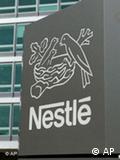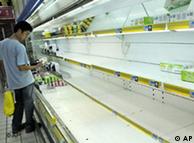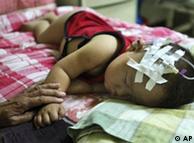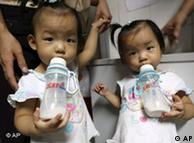Nestle Says It is Confident of Milk-Product Safety
As the milk scandal widens, Swiss food giant Nestle said it was "confident" that its products in China were safe. Media reports had suggested its products were laced with a chemical that killed four babies.
"Following press reports in Hong Kong earlier today claiming that traces of melamine had been found in a Nestle growing-up milk, Nestle is confident that none of its products in China is made from milk adulterated with melamine," said the group in a statement.
Media reports had claimed that Neslac Gold 1+ might be affected, but Nestle pointed out that the Hong Kong government's food safety department had declared the product safe.
Nestle cites safety tests
The product was tested by the Hong Kong Standards and Testing Center from Sept. 18 to 20, as well as the Food Industry Research and Development in Taiwan on Sept. 16, said Nestle.
"Neither test detected melamine in the product," the Swiss group said, according to AFP news service. It added that it regularly carried out more than 70 different tests on infant formula and other milk products.
So far, four babies have died after drinking milk powder contaminated with melamine, according to government statements.
Spreading scandal
One of the most serious health scandals involving Chinese-made goods, the melamine scare has spread from milk powder to regular milk, yoghurt and ice cream from some of China's biggest dairy manufacturers.
 Bildunterschrift: Großansicht des Bildes mit der Bildunterschrift: Swiss firm Nestle says it is not involved
Bildunterschrift: Großansicht des Bildes mit der Bildunterschrift: Swiss firm Nestle says it is not involved
On Sunday, Sept. 21, Hong Kong's government said a three-year-old girl developed a kidney stone after drinking tainted Chinese milk powder -- thought to be the first related sickness outside mainland China.
Retailers in the southern Chinese territory said they were emptying shelves of all milk powder products from Nestle, plastic-bottled Dutch Lady milk, and canned Mr Brown coffee.
Numbers of victims rise dramatically
While Nestle said it was "confident" its products in China were safe, The Center for Food Safety, a Hong Kong government body, said it had found melamine in a Nestle Dairy Farm pure milk sample from north-eastern China.
Singapore has also found melamine in a Chinese-made milk candy, authorities there said late Sunday.
Meanwhile, in a dramatic update of previous figures on Monday, Sept. 22, the Chinese health ministry said a total of 52,857 children were taken to the hospital after drinking milk thought to have been contaminated by the industrial chemical.
 Bildunterschrift: Großansicht des Bildes mit der Bildunterschrift: Shanghai shelves were cleared of milk products
Bildunterschrift: Großansicht des Bildes mit der Bildunterschrift: Shanghai shelves were cleared of milk products
Most had "basically recovered" but 12,892 of them remained hospitalized, a health ministry official told AFP.
Product ban in Taiwan
Increasingly, countries were moving to ban or limit Chinese dairy imports. Taiwan was the latest to join in, saying it would ban all Chinese milk products with immediate notice, regardless of brand, because of consumer concerns.
"There is no time frame for the ban," said Wang Chih Chao, an official with the Department of Health. It said milk products already on the shelves after passing safety tests would not be removed, however.
Melamine, normally used in making plastics, was first found in infant milk formula in Chinese markets but has since been detected in a range of products with dairy ingredients both in China and abroad.
The discovery is the latest in a series of scandals to tarnish the reputation of Chinese products. It has led to mass recalls and a Chinese government campaign to tighten quality inspections across the dairy sector.
 Bildunterschrift: Großansicht des Bildes mit der Bildunterschrift: Four deaths have been reported
Bildunterschrift: Großansicht des Bildes mit der Bildunterschrift: Four deaths have been reported
The scandal stems from the practice of adding melamine to watered-down milk to give it the appearance of higher protein levels.
History of consumer scandals in China
Up to now a host of countries -- Bangladesh, Brunei, Burundi, Japan, Gabon, Malaysia, Myanmar, Singapore and Tanzania -- have barred Chinese milk products or taken some other form of action to curb consumption.
The melamine scandal first came to light two weeks ago in state-controlled media, but some press reports say the scam had been going on for years.
China has been hit by a wave of embarrassing scandals in recent years over dangerous products including food, drugs and toys, spoiling its manufacturing reputation.
Last year, melamine was found in pet food containing Chinese ingredients that killed cats and dogs in the United States.
source:

